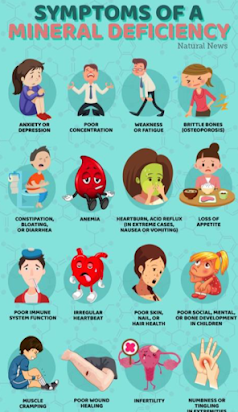Vitamins and minerals
Your body only needs small amounts of vitamins and minerals to function properly. Here's a clear overview:
🧠 Vitamins
These are organic compounds that your body needs for things like immunity, making energy, and making blood clot. Vitamins of all kinds: Types of vitamins, main uses, and sources Skin health, immunity, a fat-soluble vision, carrots, sweet potatoes, and spinach B1 (Thiamine) Water-soluble Energy metabolism, nerve function Whole grains, pork
B2 (riboflavin), which is soluble in water, is useful for making energy and maintaining healthy skin. B3 (Niacin), which is soluble in water, is used for digestion, the skin, and nerves. It is also found in meat, peanuts, and whole grains. B6 soluble in water Brain development and immune function Potatoes, chicken, and bananas B12 Water-soluble Red blood cell formation, nerve function Meat, fish, dairy
C Water-soluble Antioxidant, collagen production, immunity Citrus fruits, bell peppers
D Fat-soluble Bone health, calcium absorption Sunlight, fortified milk, fatty fish
E Fat-soluble Antioxidant, skin health Nuts, seeds, vegetable oils
K Fat-soluble Blood clotting, bone health Leafy greens, broccoli
🪨 Minerals
Minerals are inorganic elements that help with processes like fluid balance, muscle contractions, and building bones and teeth.
Types of Minerals:
Mineral Type Main Functions Sources
Calcium is essential for the health of the bones, teeth, and muscles Dairy, leafy greens, Iron makes hemoglobin, which transports oxygen, and is a trace element in red meat, beans, and spinach. Magnesium Major Muscle and nerve function, energy production Nuts, whole grains
Major potassium, fluid balance, nerve signals, and muscle contractions Potatoes, bananas Zinc Trace Immune function, wound healing Meat, dairy, nuts
Sodium Major Fluid balance, nerve function Salt, processed foods
Major Phosphorus Bone health and production of energy Meat, dairy, and nuts Iodine Trace Thyroid function Iodized salt, seafood
Selenium Trace Antioxidant, thyroid health Brazil nuts, seafood
✅ Tips for Getting Enough
Eat a balanced diet with fruits, vegetables, whole grains, dairy, and proteins.
Supplement only if prescribed by a physician. Cooking and food processing can affect vitamin content—steaming and fresh/raw foods can help retain







Comments